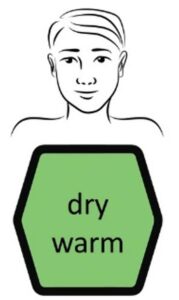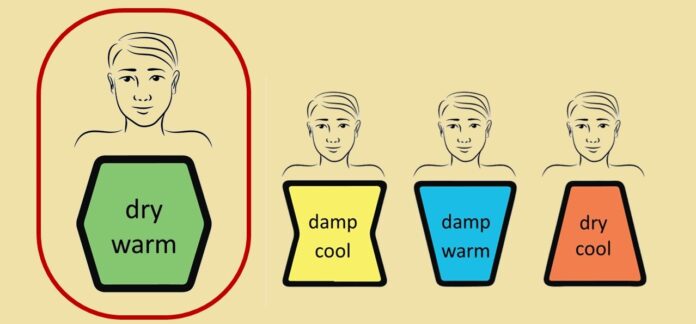Taeeumin is also Kapha-Pitta in Ayurveda, Choleric in Unani, Power in Need Theory, ESTP, and ISTP in MBTI
By David Lee L.Ac
Sasang constitutions are already identified by countries outside of Korea.
Because Sasang four constituions are present in all people around the world, we can use other systems to help idenify the Sasang constitutions. Below, you will find a parellel between Dr. Jema Lee’s Sasang temperament characterics with that of Indian Ayurveda, Greco-Roman Unani (Four Temperaments), and American Need Theory, Myers-Briggs Type Indicator (MBTI), DiSC, and Social Styles.

Taeeumin is a Greater Yin Dry Primary and Lesser Yang Hot Secondary constitution. Taeeumin is also Kapha-Pitta in Ayurveda, Choleric in Unani, Power in Need Theory, ESTP and ISTP in MBTI, “D” in DiSC, and Driving in Social Styles. About 25% of in any given population is a Taeeumin.
These descriptions are not only clarification of the Sasang constitutions, but also a comprehensive way to correctly diagnose the constitutions. One or several words should not be used to identify a constitution. Rather, one should consider the collection of words and form a holistic picture.
|
1. |
þ |
action-oriented feedback |
|
2. |
þ |
adventurous |
|
3. |
þ |
businesslike |
|
4. |
þ |
candid |
|
5. |
þ |
challenging |
|
6. |
þ |
competitive behavior |
|
7. |
þ |
confident |
|
8. |
þ |
decisive |
|
9. |
þ |
delegating |
|
10. |
þ |
dominating |
|
11. |
þ |
efficient |
|
12. |
þ |
empowering self and others |
|
13. |
þ |
enabling others |
|
14. |
þ |
fact-oriented |
|
15. |
þ |
fast-paced |
|
16. |
þ |
fighting for a cause |
|
17. |
þ |
forceful |
|
18. |
þ |
getting things moving along |
|
19. |
þ |
goal-oriented |
|
20. |
þ |
greater impact |
|
21. |
þ |
hard-driving |
|
22. |
þ |
impatient |
|
23. |
þ |
impressive |
|
24. |
þ |
independent |
|
25. |
þ |
leadership |
|
26. |
þ |
making decisions |
|
27. |
þ |
powerful |
|
28. |
þ |
practical |
|
29. |
þ |
results-oriented |
|
30. |
þ |
rough |
|
31. |
þ |
self-directed |
|
32. |
þ |
self-reliant |
|
33. |
þ |
strong-willed |
|
34. |
þ |
takes charge |
|
35. |
þ |
takes a definitive stand |
|
36. |
þ |
takes responsibility for moving ahead and making decisions |
|
37. |
þ |
task-oriented |
In an intense state or in a high-tension situation, this personality type quickly comes across to others as forceful, impersonal, and independent. They move fast, talk quickly, purposefully make eye-contact, will be the first to extend their hand for a handshake, put their arm around others’ shoulders as a gesture of friendship or as a strong assurance, and would rather talk more about tasks to be accomplished than their personal stories.
They are often the weakest listeners of all four types because they feel they do not have time and tend to know the answer. Because they tend to take on too much, they can seem too demanding and insensitive toward others. They are not very diplomatic due to coming on strong and their innate bluntness. They do not like rules and regulations and are happy looking for loopholes. They frequently challenge the status quo, overlooking risks and cautions.
Following are some of their mantras: “We’re going to do things my way,” “My way or the highway,” “I do not take ‘no’ for an answer,” “Pain is a stimulant to a driving force,” “I work through pain,” “I want it done right and I want it done now,” “Winning isn’t everything, it is the only thing.”
|
38. |
þ |
aggressive |
|
39. |
þ |
always I-am-correct attitude |
|
40. |
þ |
ambitious |
|
41. |
þ |
argumentative |
|
42. |
þ |
assertive |
|
43. |
þ |
autocratic |
|
44. |
þ |
commanding |
|
45. |
þ |
competitive |
|
46. |
þ |
decisive |
|
47. |
þ |
demanding |
|
48. |
þ |
determined |
|
49. |
þ |
direct |
|
50. |
þ |
dismissive |
|
51. |
þ |
dominating |
|
52. |
þ |
domineering |
|
53. |
þ |
driving |
|
54. |
þ |
egocentric |
|
55. |
þ |
forceful |
|
56. |
þ |
harsh |
|
57. |
þ |
higher status |
|
58. |
þ |
high risk |
|
59. |
þ |
impressive |
|
60. |
þ |
inquisitive |
|
61. |
þ |
mental fortitude |
|
62. |
þ |
needs to have the last word |
|
63. |
þ |
overbearing |
|
64. |
þ |
overly confident |
|
65. |
þ |
pioneering |
|
66. |
þ |
pushy |
|
67. |
þ |
results-oriented |
|
68. |
þ |
self-perceived grandeur |
|
69. |
þ |
speaking harshly |
|
70. |
þ |
strong-willed |
|
71. |
þ |
unconquerable |

































